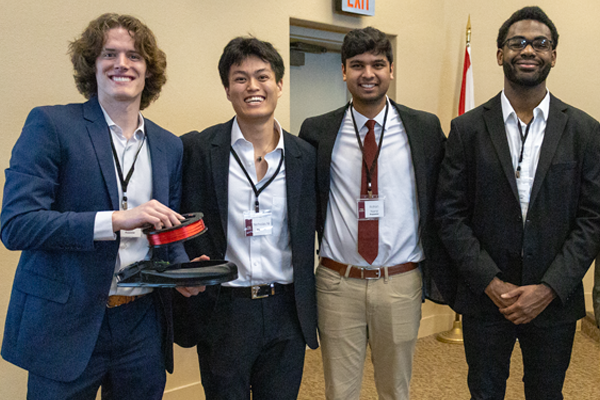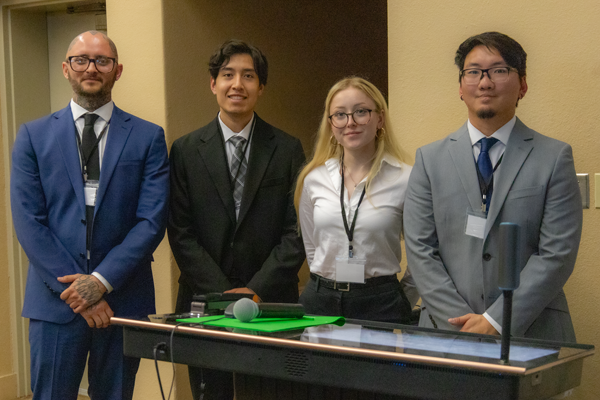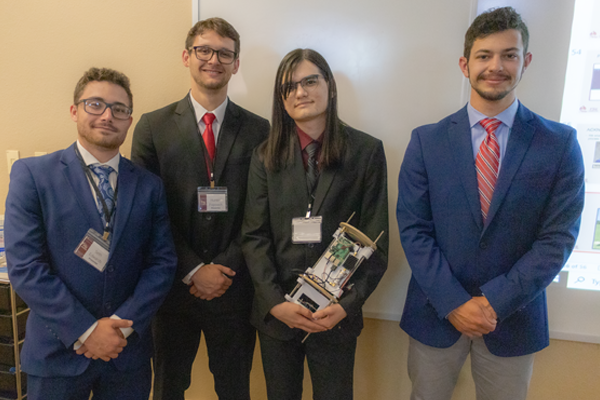Each semester our seniors formally present their projects at the end of term before their professors, peers, mentors and community partners. Following the presentation is a Q&A session from the attendees.
Electrical and Computer Engineering 2025

Smart Wireless Charging
Rohan Nana (EE), Nicholas Ni (CpE), Antonne Williams (CpE), Christian Rich (EE)
With the growing adoption and increasing market capitalization of electric vehicles (EVs) and autonomous systems, the development of innovative and user-friendly wireless charging solutions has become a critical priority. Current challenges with the technology include users needing to park perfectly over a transmitting coil, decreasing convenience and practicality. This project proposes an adaptively tuned wireless charging system that leverages machine learning for real-time tuning. The system will be fully automated, allowing users to monitor charging metrics remotely while eliminating the need for precise parking or vehicle alignment, as it will compensate for any coil misalignment. This technology aims to improve the way EVs are charged, enhancing user convenience and accessibility on a global scale.

Static Works
Presenters: Ector Lopez-Trejo, Zachary Scott, Logan Bearringer, Samantha Gibel
The rapid advancement in racing platform capabilities have led to unprecedented performance, subjecting drivers to extreme forces that are surpassing physiological limits. Maintaining precise vehicle control has become increasingly complex, making necessary the development of assistive technologies. Contemporary solutions have begun focusing on steering ratio modulation and the implementation of steer-by-wire systems, following past trends in aerospace innovation.
The aerospace industry has successfully implemented fly-by-wire systems, and in the most high performance applications, proprioception as a part of the control scheme is well proven. Proprioception is the human body’s ability to sense position and movement in three-dimensional space, and the human's inherent ability for proprioception makes it an ideal part of a closed loop control system. This is an opportunity to enhance the human-machine interface in a high-performance environment, where the margins for error are minute. The proposed research aims to develop an automotive proprioception steering system that is engineered for high-performance racing vehicles, and will be fully vetted in a simulated racing environment. This novel approach seeks to leverage human proprioception capabilities with advanced electronic control systems to revolutionize how drivers interact with their vehicles under extreme conditions.

Sky Chief
Vehicle Presenters: Seth Edwards, Hunter Popovich, Steven-Thomas Dvorak, Dylan Bragg
The SKY CHIEF project follows the guidelines of the 2025 USCLI NASA competition in designing, constructing, and testing both subscale and full-scale rockets for flight and recovery. The rocket will achieve an altitude between 3,500 and 5,500 feet while carrying a payload to transmit between three and eight critical data points. These include temperature at the landing site, apogee reached, battery status, onboard STEMnaut orientation, time of landing, maximum velocity, landing velocity, and calculated STEMnaut survivability. In addition to meeting these requirements, the project incorporates an independent objective of integrating a camera into the rocket to capture in-flight and landing footage. The project emphasizes precise flight performance, payload data transmission, and reliable recovery, aligning with NASA's engineering and safety standards to validate mission success.
